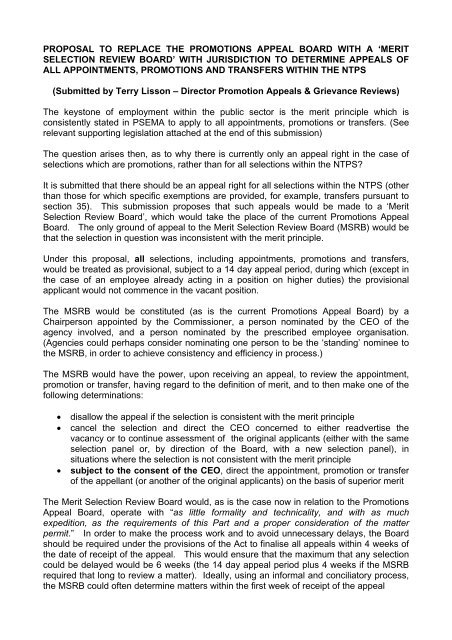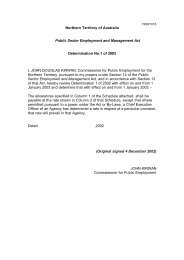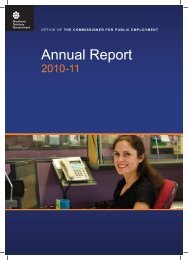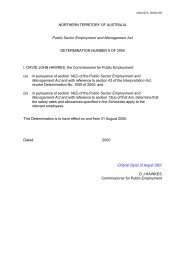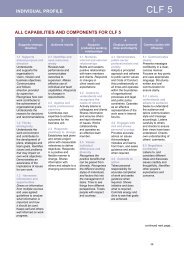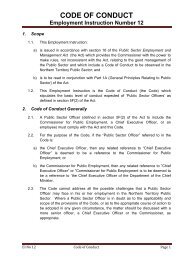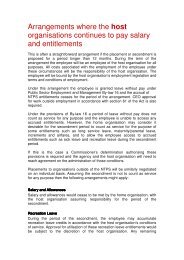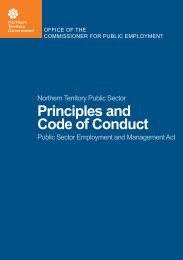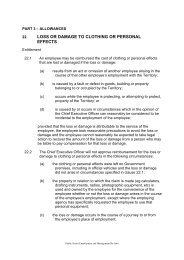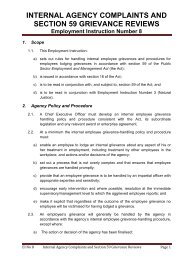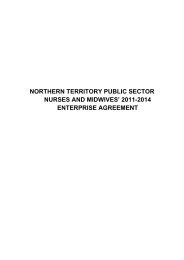Terry Lisson - Office of the Commissioner for Public Employment
Terry Lisson - Office of the Commissioner for Public Employment
Terry Lisson - Office of the Commissioner for Public Employment
You also want an ePaper? Increase the reach of your titles
YUMPU automatically turns print PDFs into web optimized ePapers that Google loves.
PROPOSAL TO REPLACE THE PROMOTIONS APPEAL BOARD WITH A ‘MERITSELECTION REVIEW BOARD’ WITH JURISDICTION TO DETERMINE APPEALS OFALL APPOINTMENTS, PROMOTIONS AND TRANSFERS WITHIN THE NTPS(Submitted by <strong>Terry</strong> <strong>Lisson</strong> – Director Promotion Appeals & Grievance Reviews)The keystone <strong>of</strong> employment within <strong>the</strong> public sector is <strong>the</strong> merit principle which isconsistently stated in PSEMA to apply to all appointments, promotions or transfers. (Seerelevant supporting legislation attached at <strong>the</strong> end <strong>of</strong> this submission)The question arises <strong>the</strong>n, as to why <strong>the</strong>re is currently only an appeal right in <strong>the</strong> case <strong>of</strong>selections which are promotions, ra<strong>the</strong>r than <strong>for</strong> all selections within <strong>the</strong> NTPS?It is submitted that <strong>the</strong>re should be an appeal right <strong>for</strong> all selections within <strong>the</strong> NTPS (o<strong>the</strong>rthan those <strong>for</strong> which specific exemptions are provided, <strong>for</strong> example, transfers pursuant tosection 35). This submission proposes that such appeals would be made to a ‘MeritSelection Review Board’, which would take <strong>the</strong> place <strong>of</strong> <strong>the</strong> current Promotions AppealBoard. The only ground <strong>of</strong> appeal to <strong>the</strong> Merit Selection Review Board (MSRB) would bethat <strong>the</strong> selection in question was inconsistent with <strong>the</strong> merit principle.Under this proposal, all selections, including appointments, promotions and transfers,would be treated as provisional, subject to a 14 day appeal period, during which (except in<strong>the</strong> case <strong>of</strong> an employee already acting in a position on higher duties) <strong>the</strong> provisionalapplicant would not commence in <strong>the</strong> vacant position.The MSRB would be constituted (as is <strong>the</strong> current Promotions Appeal Board) by aChairperson appointed by <strong>the</strong> <strong>Commissioner</strong>, a person nominated by <strong>the</strong> CEO <strong>of</strong> <strong>the</strong>agency involved, and a person nominated by <strong>the</strong> prescribed employee organisation.(Agencies could perhaps consider nominating one person to be <strong>the</strong> ‘standing’ nominee to<strong>the</strong> MSRB, in order to achieve consistency and efficiency in process.)The MSRB would have <strong>the</strong> power, upon receiving an appeal, to review <strong>the</strong> appointment,promotion or transfer, having regard to <strong>the</strong> definition <strong>of</strong> merit, and to <strong>the</strong>n make one <strong>of</strong> <strong>the</strong>following determinations:• disallow <strong>the</strong> appeal if <strong>the</strong> selection is consistent with <strong>the</strong> merit principle• cancel <strong>the</strong> selection and direct <strong>the</strong> CEO concerned to ei<strong>the</strong>r readvertise <strong>the</strong>vacancy or to continue assessment <strong>of</strong> <strong>the</strong> original applicants (ei<strong>the</strong>r with <strong>the</strong> sameselection panel or, by direction <strong>of</strong> <strong>the</strong> Board, with a new selection panel), insituations where <strong>the</strong> selection is not consistent with <strong>the</strong> merit principle• subject to <strong>the</strong> consent <strong>of</strong> <strong>the</strong> CEO, direct <strong>the</strong> appointment, promotion or transfer<strong>of</strong> <strong>the</strong> appellant (or ano<strong>the</strong>r <strong>of</strong> <strong>the</strong> original applicants) on <strong>the</strong> basis <strong>of</strong> superior meritThe Merit Selection Review Board would, as is <strong>the</strong> case now in relation to <strong>the</strong> PromotionsAppeal Board, operate with “as little <strong>for</strong>mality and technicality, and with as muchexpedition, as <strong>the</strong> requirements <strong>of</strong> this Part and a proper consideration <strong>of</strong> <strong>the</strong> matterpermit.” In order to make <strong>the</strong> process work and to avoid unnecessary delays, <strong>the</strong> Boardshould be required under <strong>the</strong> provisions <strong>of</strong> <strong>the</strong> Act to finalise all appeals within 4 weeks <strong>of</strong><strong>the</strong> date <strong>of</strong> receipt <strong>of</strong> <strong>the</strong> appeal. This would ensure that <strong>the</strong> maximum that any selectioncould be delayed would be 6 weeks (<strong>the</strong> 14 day appeal period plus 4 weeks if <strong>the</strong> MSRBrequired that long to review a matter). Ideally, using an in<strong>for</strong>mal and conciliatory process,<strong>the</strong> MSRB could <strong>of</strong>ten determine matters within <strong>the</strong> first week <strong>of</strong> receipt <strong>of</strong> <strong>the</strong> appeal
Selections are fundamental to <strong>the</strong> operation <strong>of</strong> <strong>the</strong> NTPS and underpin <strong>the</strong> work<strong>for</strong>ce.However, currently <strong>the</strong>re is dissatisfaction with selection processes and <strong>the</strong>ir outcomes, asevidenced by <strong>the</strong> fact that over 5% <strong>of</strong> promotions (which make up only a third <strong>of</strong> allselections), are appealed, and that <strong>the</strong> most common reason <strong>for</strong> s 59 grievances iscomplaints about selection. It is probably safe to assume that <strong>for</strong> every person whoactually takes <strong>the</strong> step <strong>of</strong> appealing a promotion or lodging a grievance about a selection,<strong>the</strong>re are many more who were dissatisfied with <strong>the</strong> result, but unwilling to take it fur<strong>the</strong>r.A recent survey <strong>of</strong> stakeholders involved with promotion appeal and grievance reviewprocesses showed a strong preference <strong>for</strong> retaining promotion appeals, and this view issupported by unions. Presumably a move to extend appeal rights to cover all selections in<strong>the</strong> NTPS, not just promotions, would be welcomed by employees and <strong>the</strong>ir unions. Thismust, <strong>of</strong> course, be balanced against agencies’ need to fill positions in an efficient andtimely manner. However, an appeal process that was required by statute to be completedwithin four weeks, would meet <strong>the</strong> needs <strong>of</strong> both groups, as well as being a clear andtransparent demonstration <strong>of</strong> <strong>the</strong> fulfilling <strong>of</strong> <strong>the</strong> <strong>Commissioner</strong>’s function as set out ins13(b) to “promote, uphold and ensure adherence to <strong>the</strong> merit principle in <strong>the</strong> selection <strong>of</strong>persons as, and <strong>the</strong> promotion and transfer <strong>of</strong>, employees.”At present agencies and employees alike are frustrated by selection practices that havedeveloped in <strong>the</strong> NTPS, and <strong>the</strong>re is no question that selections processes areunreasonably onerous and time consuming. The view <strong>of</strong> recent Promotions AppealBoards has been that in many cases <strong>the</strong> merit principle is compromised by inflexibleselection processes that lose sight <strong>of</strong> <strong>the</strong> goal <strong>of</strong> finding <strong>the</strong> best person <strong>for</strong> <strong>the</strong> job byattempting to follow a rigid, <strong>for</strong>mulistic approach to selection. A <strong>for</strong>ward-thinking MeritSelection Review Board could do much by way <strong>of</strong> education and training to debunk <strong>the</strong>many recruitment myths that have led to this problem, and could, with <strong>the</strong> power <strong>of</strong> <strong>the</strong>Board behind it, ensure that merit selection processes were not only improved andstreng<strong>the</strong>ned, but also streamlined. A merit appeal board system statutorily required tocomplete its review function within four weeks could demonstrate very clearly, by concreteexample, that fair, merit-based selection processes can be conducted within short timeframes.While creating an overall Merit Selection Review Board might create an initial leap in <strong>the</strong>number <strong>of</strong> merit selection appeals, <strong>the</strong> process, by providing education and transparentin<strong>for</strong>mation about merit decisions, could lead in <strong>the</strong> longer term to a sharp reduction in <strong>the</strong>number <strong>of</strong> merit appeals, and a much higher level <strong>of</strong> satisfaction and understanding aboutselection processes amongst employees.At present <strong>the</strong> only remedy available in relation to selections that are not promotions issection 59 review by <strong>the</strong> <strong>Commissioner</strong>. The <strong>Commissioner</strong> has unlimited powers inreviewing grievances, and could, in <strong>the</strong>ory, upon completion <strong>of</strong> a review, order <strong>the</strong>cancellation <strong>of</strong> a selection and <strong>the</strong> appointment <strong>of</strong> <strong>the</strong> grievor. However, <strong>the</strong>re are anumber <strong>of</strong> reasons why this is unlikely to happen – <strong>the</strong> most important being that personsselected <strong>for</strong> positions that are not promotions are not told that <strong>the</strong>ir selection is provisional,or subject to overturning through a grievance process. Also, <strong>the</strong> fact is that it is simply notpractical <strong>for</strong> <strong>the</strong> <strong>Commissioner</strong> alone, even with <strong>the</strong> help <strong>of</strong> grievance review managers, toinvestigate and <strong>the</strong>n determine whe<strong>the</strong>r a selection was consistent with <strong>the</strong> merit principle.The process suggested in this proposal – i.e. setting up a general Merit Selection ReviewBoard to decide appeals lodged in relation to any appointments, promotion or transfers,and requiring such appeals to be determined within a maximum <strong>of</strong> four weeks – wouldensure that <strong>the</strong> merit principle could be effectively en<strong>for</strong>ced in relation to all selections, notjust promotions as is now <strong>the</strong> case.
Relevant Sections <strong>of</strong> <strong>the</strong> Merit Selection Guide, PSEMA and Regulations• Introduction to <strong>the</strong> Merit Selection Guide:A fundamental tenet <strong>of</strong> human resource management, upon whichservice in <strong>the</strong> Nor<strong>the</strong>rn Territory <strong>Public</strong> Sector is based, is <strong>the</strong> meritprinciple.In its broadest sense, merit based selection is central to apolitical<strong>Public</strong> Sector accountability in that it ensures that employees providingservices to <strong>the</strong> Territory Community have <strong>the</strong> appropriate knowledge,skills and levels <strong>of</strong> responsibility to do <strong>the</strong>ir jobs.At any level within <strong>the</strong> workplace, <strong>the</strong> key to success is to have <strong>the</strong>person with <strong>the</strong> most appropriate knowledge and skills to do each job.If <strong>the</strong> selection is right it will have a positive impact across <strong>the</strong> wholeunit, get it wrong and <strong>the</strong> overall per<strong>for</strong>mance <strong>of</strong> <strong>the</strong> unit, and agency,is at risk.• The Interpretation Section <strong>of</strong> PSEMA provides in subsection (2) that:A reference in this Act to <strong>the</strong> merit principle is a reference to <strong>the</strong>principle that an appointment, promotion, or transfer under this Actshould be on <strong>the</strong> basis <strong>of</strong>, and only on <strong>the</strong> basis <strong>of</strong>, <strong>the</strong> capacity <strong>of</strong> <strong>the</strong>person to per<strong>for</strong>m particular duties, having regard to <strong>the</strong> person’sknowledge, skills, qualifications and experience and <strong>the</strong> potential <strong>for</strong>future development <strong>of</strong> <strong>the</strong> person in employment in <strong>the</strong> <strong>Public</strong> Sector.• Pursuant to section 13(b) <strong>of</strong> <strong>the</strong> Act, one <strong>of</strong> <strong>the</strong> <strong>Commissioner</strong>’s functions is to“promote, uphold and ensure adherence to <strong>the</strong> merit principle in <strong>the</strong> selection <strong>of</strong>persons as, and <strong>the</strong> promotion and transfer <strong>of</strong>, employees.”• Section 29(2) <strong>of</strong> <strong>the</strong> Act provides that:Subject to this Act, a Chief Executive <strong>Office</strong>r shall not appoint a person asan employee, or promote or transfer an employee, except inaccordance with <strong>the</strong> merit principle and this Act.• Regulation 3 to PSEMA provides that:The following principles <strong>of</strong> human resource management shall beobserved in <strong>the</strong> <strong>Public</strong> Sector:(a) subject to <strong>the</strong> Act, <strong>the</strong> selection <strong>of</strong> persons to fill vacanciesin <strong>the</strong> <strong>Public</strong> Sector shall be on <strong>the</strong> basis <strong>of</strong> merit;(b) human resource management actions shall be taken in such amanner as to ensure <strong>the</strong> exclusion <strong>of</strong> nepotism, patronage,favouritism and unlawful and unjustified discrimination on anyground in respect <strong>of</strong> all employees and persons seekingemployment in <strong>the</strong> <strong>Public</strong> Sector;(Emphasis has been added in <strong>the</strong> above quotations from PSEMA and its Regulations.)


